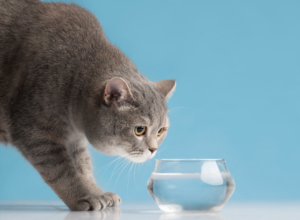
May is Pet Awareness Month!
May is an important month for pet lovers all around the world as it is dedicated to raising awareness about responsible pet ownership and care. During Pet Awareness Month, we have an opportunity to educate ourselves and others about the various aspects of pet health and well-being. As pet lovers, we deeply care about the well-being of our furry companions. We pamper them with cozy beds, delightful treats, and engaging toys. But there is one vital element that often goes unnoticed, yet is absolutely crucial for their health and happiness: water. Let’s take a moment to delve into the significance of water in the lives of our beloved pets and why ensuring their proper hydration is essential.
Life-Sustaining Functions of Water
Water plays a pivotal role in maintaining various bodily functions of our pets. Just like humans, animals depend on water to regulate their body temperature, lubricate joints, aid digestion, and support the transportation of nutrients throughout their bodies. Proper hydration allows their organs, cells, and tissues to function optimally, ensuring overall vitality and well-being. Understanding the specific water needs of different pets is essential for their overall health and well-being. While water requirements vary depending on factors such as species, size, age, and activity level, there are general guidelines that can help us ensure our pets stay properly hydrated. For example, dogs generally need about 1 ounce of water per pound of body weight, while cats require about 3.5 to 4.5 ounces of water per 5 pounds of body weight. It’s important to consult with your veterinarian to determine the appropriate water intake for your specific pet and make adjustments as needed.

Preventing Dehydration in Our Furry Friends
Dehydration is a serious concern for pets and can have severe consequences and it’s crucial for pet owners to be able to recognize the signs early on. Factors such as hot weather, physical exertion, illness, or insufficient water intake can lead to dehydration. Pets can’t simply express their thirst verbally, making it crucial for us as responsible pet owners to monitor and ensure they have access to fresh water at all times. Common signs of dehydration in pets include excessive panting, dry and sticky gums, sunken eyes, dry skin, lethargy, loss of appetite, and dark yellow or amber-colored urine. Dehydration can even result in organ failure if left unaddressed. If you notice any of these signs, it’s important to take immediate action and provide your pet with fresh water. Severe cases of dehydration may require veterinary attention, so always consult with your veterinarian if you have concerns.
Some pets may be finicky drinkers or have preferences for certain water sources. To encourage water consumption and help avoid dehydration, you can try the following tips:
- Provide multiple water bowls in different areas of your home to make it easily accessible for your pets.
- Keep the water bowls clean and regularly change the water to ensure freshness.
- Consider using water fountains or automatic water dispensers that provide a continuous flow of fresh water, which may be more enticing to pets.
- Remember to monitor your pet’s water intake and observe any changes in their drinking habits, as it could be an indication of an underlying health issue.
Kidney Health and Urinary Tract Function
Water plays a vital role in maintaining healthy kidney function and promoting proper urinary tract health in pets. Ample water intake helps flush out toxins, prevent the formation of urinary crystals or stones, and minimize the risk of urinary tract infections. By keeping their hydration levels in check, we can support our pets’ urinary health and contribute to their overall wellness. As pets age, their urinary systems may become compromised, so staying hydrated must be a priority.
Weight Management and Digestive Health
Water is an essential aid in weight management and maintaining a healthy digestive system for our pets. Proper hydration helps regulate metabolism, ensuring efficient nutrient absorption and waste elimination. Adequate water intake can also prevent constipation and promote regular bowel movements, reducing the likelihood of gastrointestinal issues and discomfort.
Hydration Promotes Healthy Skin and Coat
Hydrated skin is the foundation of a lustrous coat for our pets. Water keeps their skin moisturized, preventing dryness, itching, and flakiness. It also contributes to a healthier coat by promoting hair follicle strength and minimizing excessive shedding. Providing our pets with sufficient water allows them to maintain a glossy, vibrant coat, a true reflection of their overall health.
Boost Your Pet’s Well Being with Quality Water!
Water is a vital elixir of life, and its importance for our beloved pets cannot be overstated. By prioritizing hydration, we actively contribute to their well-being, vitality, and longevity. As pet lovers, let’s ensure our furry companions have access to clean, fresh water at all times, and let’s stay vigilant in monitoring their water intake. Providing clean and safe water is vital for our pets’ health. Tap water may contain impurities or chemicals that can be harmful to pets, such as chlorine or heavy metals. Using filtered or purified water can help ensure that the water we offer our pets is free from contaminants. Furthermore, leveling up the power of hydration by giving them Weo water is an even better strategy! By doing so, we can be confident that we are providing them with the best water and best care, helping them lead happy, healthy lives.
By Kelly Halderman
